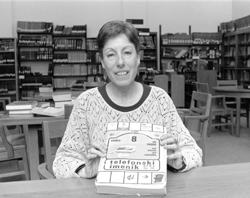The University Record, January 24, 2000 By Joanne Nesbit
News and Information Services

When the call went out last summer, Yugoslav phone books began arriving at the University from around the world. The telephone books from 1968 to 1995 contained what might be the only records available to document residency for the close to one million people forced to evacuate Kosovo.
Most of the government archives in Kosovo have been burned, and personal documentation was stripped from refugees prior to their crossing the Kosovo borders to other countries. The major library holdings in Bosnia, including the collections in the National and University Library and the Oriental Institute, were destroyed by Serb Nationalist artillery during the siege of Sarajevo. The Sarajevans were forced to burn the few surviving books for fuel during the winters. And the last Yugoslav census did not provide reliable and/or consistent demographic information, says Janet Crayne, project coordinator at the Library’s Slavic Division.
An advisory board representing the U-M, Harvard University, the University of Montreal and University of Washington, in collaboration with microfilmer Norman Ross Inc., coordinated the collection and filming of phone books from former Yugoslav republics and their successor states Bosnia and Hercegovina, Croatia, Macedonia, Yugoslavia (Serbia, Montenegro, Vojvodina and Kosovo) and Slovenia. Donations were international in scope and came from public and academic libraries, as well as from personal collections.
“The most pressing goal now is to provide information on residency and property ownership for the Kosovars forced to flee to other countries,” Crayne says. “The information in these phone books could facilitate and expedite repatriation.”
The Yugoslav phone books have a separate section on Kosovo, so established Kosovar residences can be noted and traced at least biennially, Crayne explains. The project also includes census data from the region for 1971, 1981 and 1991, as well as trade directories.
The information in the books is being microfilmed, and will be made available to such agencies as the United Nations High Commissioner for Refugees and the U.S. Department of State, and to organizations compiling databases for that region of the world. Digitization opportunities are being considered and funding is being sought for such a project.
“We are delighted that these resources have been identified which will provide critical data in support of the repatriation effort for the Kosovar people,” says Library Director William Gosling. “Janet Crayne and her colleagues are to be commended for their efforts to make this vital data available to support this humanitarian initiative.”
For more information, or to donate phone books, contact Crayne, 111G Hatcher Graduate Library North 1205, 936-2348, or [email protected].

